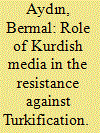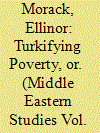| Srl | Item |
| 1 |
ID:
175519


|
|
|
|
|
| Summary/Abstract |
Kurds are the largest minority group in Turkey and their position is one of conflict with the ‘Turkishness Contract,’ a concept that describes the unspoken convention ensuring the ethnic privilege of Sunni-Turks and the exclusion or assimilation of those who resist Turkification. Kurds have thus experienced oppression since late Ottoman times and throughout the Republican years, up to the present day. This article suggests that the Kurdish media in Turkey have always had to negotiate state oppression by articulating a strategy of resistance to the hegemonic knowledge imposed by the state and reproduced by the mainstream media. They thus reject the Turkification that would be required to abide by the Turkishness Contract. This article's investigation of the Kurdish media takes place through an exploration of an online news platform, a self-proclaimed ‘voice of the weak.’ The data were collected through semi-structured in-depth interviews with journalists and editors of the platform.
|
|
|
|
|
|
|
|
|
|
|
|
|
|
|
|
| 2 |
ID:
164901


|
|
|
|
|
| Summary/Abstract |
This article shows that ‘Turkification’, a term widely used by historians of modern Turkey to refer to the forced transfer of property from Christian into Muslim hands, ought to be conceptualized not only in the sense of ‘enrichment’ but also, with regard to the working classes, as a process in which Muslim people inherited the poverty of their Christian predecessors. Taking İzmir as a case in point, the article first describes the plight of the overwhelmingly Christian working class prior to 1922. It then studies reports and editorials that discussed the economic and social situation in İzmir in the years 1923 to 1926, after the Turkish victory and forced migration of her Christian population. Over the course of these years, İzmir experienced a serious economic crisis, and bread prices reached levels that led to widespread undernourishment and hunger among the cityʼs poor. Agricultural production was lagging behind pre-war levels, and positive effects of ‘Turkificationʼ policies were failing to materialize. By analyzing the contemporary journalistsʼ attempts at explaining the crisis, but also pointing out national and transnational factors that they were probably unaware of, the article makes an original contribution to the economic and social history of early republican Turkey.
|
|
|
|
|
|
|
|
|
|
|
|
|
|
|
|